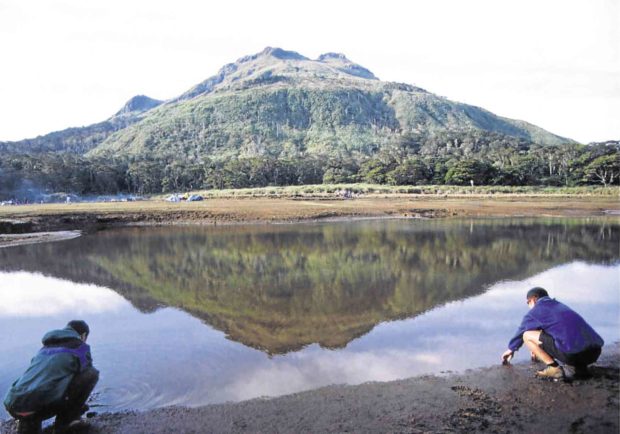Trail to Mt. Apo opened after healing from El Niño

SCENIC SPOT Groups on their way to the peak of Mt. Apo choose to rest in the area around the Lake Venado, one of the mountain’s most scenic spots. —INQUIRER PHOTO
KIDAPAWAN CITY, Cotabato, Philippines — Outdoor enthusiasts may again start their journey to Mt. Apo from this city after officials reopened a local trail following its “natural healing” from the impact of the dry spell this year.
But Joey Recemilla, city tourism officer, said the Mandarangan Trail would be opened only for the entire month of October, when the annual “Octo Trek” to the country’s highest peak is held.
Recemilla said the trail would be closed again in November to prepare its natural environment for the summer climb in April next year.
Limited access
Last summer, amid a dry spell, Mt. Apo was closed to trekking and camping upon orders of the Protected Area Management Board to prevent another fire, which broke out in the area in 2016.
Article continues after this advertisementMt. Apo can be reached through three established trails from Digos City and Santa Cruz town in Davao del Sur province, and Kidapawan in Cotabato province.
Article continues after this advertisementRecemilla said the local government would limit access to Mandarangan Trail to 50 climbers a day to effectively manage the route’s cleanliness and lessen the impact of human activity on the natural environment.
He said the trail’s vegetation was just starting to recover from the recent drought.
Water sources
“We wanted to preserve our trail as it is now starting to recover. For now, the spring … is producing water. These water sources dried up when El Niño hit the mountain,” Recemilla said.
He said water level at the Lake Venado had risen, while springs had sprouted on mountain slopes leading to the peak.
The local government has trained around 500 porters and mountain guides, who also double as “cleanliness monitors” who will check the trash of each climber to ensure that these are packed and brought down the mountain for proper disposal.
Recemilla said at least 500 trekkers had registered to use the Kidapawan trail starting Oct. 1.
He said trekkers must book with accredited travel agencies before their scheduled climb. The local government collects P2,000 per climber, which covers entry and exit fees, payment for a porter and a certificate.
Those who use another trail to climb the peak but exit through the Kidapawan trail will be asked to pay a P1,000 exit fee.
Apart from Mt. Apo’s peak, tourists also visit the Lake Agco at the foot of the mountain to dip in its hot spring.